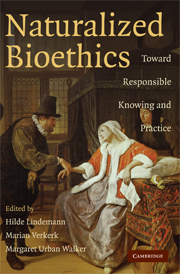Book contents
- Frontmatter
- Contents
- Contributors
- Acknowledgments
- Naturalized Bioethics
- Introduction: Groningen Naturalism in Bioethics
- I RESPONSIBLE KNOWING
- II RESPONSIBLE PRACTICE
- 7 Motivating Health: Empathy and the Normative Activity of Coping
- 8 Economies of Hope in a Period of Transition: Parents in the Time Leading Up to Their Child's Liver Transplantation
- 9 Consent as a Grant of Authority: A Care Ethics Reading of Informed Consent
- 10 Professional Loving Care and the Bearable Heaviness of Being
- 11 Ideal Theory Bioethics and the Exclusion of People with Severe Cognitive Disabilities
- 12 Epilogue: Naturalized Bioethics in Practice
- Bibliography
- Index
10 - Professional Loving Care and the Bearable Heaviness of Being
Published online by Cambridge University Press: 05 June 2012
- Frontmatter
- Contents
- Contributors
- Acknowledgments
- Naturalized Bioethics
- Introduction: Groningen Naturalism in Bioethics
- I RESPONSIBLE KNOWING
- II RESPONSIBLE PRACTICE
- 7 Motivating Health: Empathy and the Normative Activity of Coping
- 8 Economies of Hope in a Period of Transition: Parents in the Time Leading Up to Their Child's Liver Transplantation
- 9 Consent as a Grant of Authority: A Care Ethics Reading of Informed Consent
- 10 Professional Loving Care and the Bearable Heaviness of Being
- 11 Ideal Theory Bioethics and the Exclusion of People with Severe Cognitive Disabilities
- 12 Epilogue: Naturalized Bioethics in Practice
- Bibliography
- Index
Summary
A central thesis of this chapter is that to naturalize bioethics, one must adopt the perspective of the ethics of care. Doing so not only would question basic presuppositions of medicine and nursing but would also better orient bioethics to vulnerability (and therefore carnality), thereby offering a more relational, situated understanding of what health care is all about.
Theoretically and on a practical level, the ethics of care already influences present-day bioethics, at least in the Netherlands, where I live. At the University Medical Center of Groningen, the director of the Center for the Ethics of Care is Marian Verkerk, one of the Dutch pioneers of the ethics of care. In other hospitals, but also in nursing homes and institutes for mentally handicapped people, psychiatric patients, and children, there are many professionals who sympathize with the ethics of care. They view it as a contribution to their work, because of its person-oriented, practical, situation-specific approach. Economic and managerial thinking has a heavy impact on the health care system here as well: in the 1990s the implementation of managed care rationalized the way of working, and in the beginning of the third millennium, although Dutch health care is still partly financed by public means, the principle of the marketplace was introduced. In this chapter, however, the focus is on ethics.
In Western history, two paradigms have governed institutional health care.
- Type
- Chapter
- Information
- Naturalized BioethicsToward Responsible Knowing and Practice, pp. 199 - 217Publisher: Cambridge University PressPrint publication year: 2008
- 2
- Cited by



